Overcoming Jet Lag with Supplements
🌍 Introduction: When Your Body Clock Loses Track of Time
You step off the plane, excited and exhausted. The air smells different, the sun’s at the wrong angle, and your body feels like it’s running on the wrong time zone.
That’s jet lag — your internal clock out of sync with your external world.
Common symptoms include:
Trouble falling asleep or staying asleep 😴
Morning grogginess or daytime fatigue
Digestive upset or loss of appetite
Brain fog and irritability
Mood swings or anxiety
The farther you travel across time zones — especially eastward — the harder your circadian rhythm struggles to adjust.
But the right nutrients and supplements can smooth the transition, helping your body adapt faster, reduce fatigue, and get back to high-functioning mode sooner.
In this guide, we’ll explore:
How jet lag affects your body and hormones
The best supplements for circadian rhythm recovery
Practical travel strategies for fast adjustment
Science-backed ways to optimize sleep, energy, and focus
Let’s help your body land on schedule again. 🌙
Looking for supplements for This? Click here.
🧠 Part 1: Understanding Jet Lag
🕰️ The Circadian Clock
Your body runs on a 24-hour internal clock called the circadian rhythm, governed by the suprachiasmatic nucleus (SCN) in your brain.
It controls when you feel awake, sleepy, hungry, and alert — all based on cues from light, food, temperature, and hormones.
When you fly across multiple time zones, your brain’s clock doesn’t instantly match your new daylight cycle.
It’s like trying to function with your phone set to a different time zone than your laptop. Confusion, fatigue, and irritability follow.
⚡ The Hormonal Tug-of-War
The two main hormones disrupted by jet lag are:
Melatonin 🌙 → signals darkness and sleep
Cortisol ☀️ → signals morning energy and wakefulness
When these two are out of sync, you may feel sleepy mid-day and wired at midnight.
Jet lag is essentially temporary circadian misalignment — a hormonal tug-of-war between your body clock and your new environment.
✈️ East vs. West: Why Direction Matters
Flying east (e.g., New York → Paris) shortens your day. You have to fall asleep earlier, which most people find difficult.
Flying west (e.g., Paris → New York) lengthens your day. Staying up later is easier for most.
Therefore, eastward flights cause more severe jet lag because advancing your body clock (sleeping earlier) takes longer than delaying it.
🌿 Part 2: Core Supplements That Fight Jet Lag

Supplements can’t replace good sleep hygiene or hydration, but they can optimize your body’s adjustment process, supporting hormones, brain chemistry, and cellular energy.
🌙 1️⃣ Melatonin — The Master Clock Resetter
What it does:
Melatonin is a hormone your pineal gland releases in response to darkness. It tells your body, “It’s nighttime — time to rest.”
During jet lag, melatonin secretion is misaligned with your new light-dark cycle.
Supplementing melatonin helps your body synchronize faster.
How to use:
Take 0.3–3 mg melatonin about 30–60 minutes before your target bedtime in the new time zone.
Use for 2–5 nights, not long-term.
For eastward travel, take it earlier (around local 8–9 p.m.); for westward, take it slightly later (10–11 p.m.).
💡 Avoid high doses (5–10 mg) — too much can cause vivid dreams or morning grogginess.
⚡ 2️⃣ Magnesium Glycinate — The Relaxation Mineral
Magnesium supports over 300 processes in the body, including nerve signaling, muscle relaxation, and melatonin synthesis.
Why it helps:
Reduces travel-related anxiety and muscle tension
Promotes deep sleep during time zone transitions
Balances cortisol (your stress hormone)
Dosage: 200–400 mg before bed in the new time zone.
Best form: Magnesium glycinate or threonate (gentle and well absorbed).
🍵 3️⃣ L-Theanine — The Calm-Focus Amino Acid
Jet lag often comes with racing thoughts, restlessness, and poor concentration.
L-Theanine, found naturally in green tea, calms the brain without sedation.
Benefits:
Boosts alpha brain waves (relaxed alertness)
Enhances focus and mood
Works synergistically with caffeine or melatonin
Dosage: 200 mg, morning for calm focus or evening for relaxation.
🌾 4️⃣ Ashwagandha — The Adaptogen for Resilience
Ashwagandha (Withania somnifera) helps your body adapt to stress and stabilize cortisol rhythms.
Travel across time zones stresses your adrenals — and ashwagandha helps restore equilibrium.
Benefits:
Reduces anxiety and fatigue
Improves sleep onset and morning energy
Supports immune system balance (important for frequent flyers)
Dosage: 300–600 mg standardized extract (KSM-66® or Sensoril®).
🍒 5️⃣ Tart Cherry Extract — Nature’s Melatonin + Anti-Inflammatory Combo
Tart cherries naturally contain melatonin, tryptophan, and anthocyanins (potent antioxidants).
Benefits:
Improves total sleep time and quality
Reduces inflammation from long flights
Supports muscle recovery for travelers and athletes
Dosage: 480 mg extract or 8 oz tart cherry juice 1–2 hours before bed.
🌿 6️⃣ Rhodiola Rosea — Anti-Fatigue and Focus Support
Rhodiola is an adaptogen that enhances mental clarity and stamina without overstimulating your nervous system.
Perfect for: adjusting to new daytime hours while avoiding caffeine crashes.
Benefits:
Combats fatigue and brain fog
Enhances cognitive resilience
Balances serotonin and dopamine
Dosage: 200–400 mg standardized extract (3% rosavins, 1% salidroside).
Take in the morning only to avoid sleep disruption.
🧬 7️⃣ CoQ10 or PQQ — Cellular Energy Restorers
Jet lag depletes mitochondrial energy due to disrupted sleep and oxygen changes from air travel.
CoQ10 (100–200 mg) and PQQ (10–20 mg) help restore ATP production — your cells’ energy currency.
Benefits:
Reduces fatigue
Improves alertness
Supports cardiovascular health (especially useful during long flights)
💊 8️⃣ B Vitamins (B5, B6, B12) — The Energy Regulators
B vitamins support neurotransmitter synthesis, red blood cell production, and circadian balance.
B6 aids melatonin formation; B12 helps regulate the body clock; B5 reduces fatigue.
Dosage: Take a B-complex supplement with breakfast in the new time zone.
Looking for supplements for This? Click here.
🩵 Part 3: Pre-Flight Preparation — Setting the Stage
The best jet lag strategy starts before you take off.
⏰ 1️⃣ Adjust Your Schedule Gradually
If flying east, move your bedtime earlier by 30–60 minutes per day for 3 days before departure.
If flying west, go to bed and wake up later each day.
This pre-alignment helps your internal clock meet the new schedule halfway.
💡 2️⃣ Manage Light Exposure
For eastward travel, get morning sunlight in your destination time zone.
For westward travel, seek afternoon sunlight and avoid early morning glare.
Use blue-blocking glasses on flights if you want to fall asleep earlier, or remove them to stay alert when landing in daylight.
🍽️ 3️⃣ Time Your Meals
Food also entrains your circadian rhythm. Eat meals aligned with your destination’s clock as soon as possible.
Avoid heavy meals before boarding — opt for light protein and complex carbs instead.
🚰 4️⃣ Hydrate Aggressively
Airplane cabins are extremely dehydrating, increasing fatigue and headaches.
Drink at least 500 ml of water every 2 hours in flight.
Avoid alcohol and excess caffeine — they further dehydrate and disrupt melatonin release.
🌙 Part 4: In-Flight Strategies
🧘 1️⃣ Stay Physically Relaxed
Do gentle stretches in your seat or aisle every hour.
This keeps circulation strong and prevents muscle tension.
🕯️ 2️⃣ Use Natural Sleep Aids (If Needed)
For overnight flights:
0.3–1 mg melatonin
200 mg magnesium glycinate
Eye mask + neck pillow
Noise-canceling headphones or white noise app
🧴 3️⃣ Refresh Your Senses
Lavender essential oil or magnesium spray on the neck can reduce stress and promote calm.
☀️ Part 5: Upon Arrival — How to Reset Faster
☀️ 1️⃣ Get Sunlight Exposure Immediately
Natural light is the most powerful circadian regulator.
Aim for 20–30 minutes outdoors within the first 2 hours of arrival.
💊 2️⃣ Use Supplements Strategically
| Time | Supplement | Purpose |
|---|---|---|
| Morning | Rhodiola + B-Complex | Energy + alertness |
| Afternoon | Hydration + Electrolytes | Rebalance fluids |
| Evening | Magnesium + L-Theanine + Tart Cherry | Relaxation + melatonin support |
| Bedtime | Low-dose Melatonin (if needed) | Reset circadian rhythm |
Repeat this routine for 3–5 days.
🧘 3️⃣ Stay Active — But Don’t Overdo It
Light exercise such as walking or yoga boosts endorphins and blood flow, helping your body adapt.
Avoid intense workouts for the first 24 hours — they can raise cortisol further.
🍽️ 4️⃣ Eat Light and Local
Choose fresh, easy-to-digest meals like fish, vegetables, and whole grains.
Avoid late-night eating, as digestion competes with sleep.
🌡️ Part 6: Biohacks to Enhance Adaptation

🌙 1️⃣ Cold Exposure
A cold shower or splash of cold water in the morning helps reset your cortisol awakening response and boosts alertness.
🔦 2️⃣ Red Light Therapy
Red and near-infrared light exposure in the morning and evening can stabilize circadian rhythms, reduce inflammation, and improve mitochondrial energy.
💤 3️⃣ Weighted Blanket or Sleep Mask
A weighted blanket activates deep-pressure receptors that calm the nervous system.
A sleep mask blocks early light exposure when sleeping through local mornings.
🔋 4️⃣ Adaptogen Combinations
Try pairing ashwagandha + rhodiola:
Ashwagandha at night → lowers cortisol.
Rhodiola in morning → increases stamina.
This 24-hour adaptogen rhythm supports both rest and energy.
💬 Part 7: Real-World Jet Lag Recovery Plan
Here’s a simple 3-day recovery schedule for an eastward trip (e.g., Los Angeles → London):
| Time | Day 1 | Day 2 | Day 3 |
|---|---|---|---|
| Morning | Rhodiola + B-Complex | Light breakfast + sunlight | Short walk outdoors |
| Afternoon | Hydrate, stretch | Avoid naps >30 min | Drink green tea |
| Evening | Light meal + magnesium | Tart cherry juice | Melatonin (0.3 mg) if needed |
| Bedtime | 9:30–10:00 local time | Deep breathing + calm music | Maintain bedtime |
By day 3, most travelers feel fully adjusted.
🧳 Part 8: Supplement Travel Checklist
✅ Melatonin (0.3–1 mg)
✅ Magnesium glycinate or threonate
✅ L-Theanine capsules
✅ Ashwagandha extract
✅ Rhodiola Rosea (morning only)
✅ Tart cherry capsules or juice packets
✅ B-Complex supplement
✅ Electrolyte powder
💡 Keep them in your carry-on to maintain consistency during transit.
🌈 Part 9: When to Seek Professional Help
If you travel frequently and struggle with:
Severe insomnia
Chronic fatigue or mood changes
Anxiety before or after flights
You may benefit from consulting a sleep medicine specialist or functional doctor.
They can test melatonin rhythms, cortisol cycles, and nutrient levels to tailor your supplement plan.
Looking for online therapy ? Click Here.
🌠 Conclusion: From Time-Zone Chaos to Circadian Harmony
Jet lag doesn’t have to derail your productivity or peace.
By combining smart supplements, light management, hydration, and stress regulation, you can train your body to adapt faster, rest deeper, and feel sharper wherever you land.
Remember: sleep is not a passive act — it’s a skill you can optimize, even across time zones. 🌍✨
Safe travels — and sweet dreams, wherever you are. 💤
📚 References
Arendt, J. “Jet Lag: Circadian Rhythms and Sleep.” Sleep Medicine Reviews, 2009.
Sack, R. L. et al. “Circadian Rhythm Sleep Disorders: Melatonin and Light Therapy.” Sleep, 2007.
Peuhkuri, K. et al. “Diet and Sleep: The Role of Magnesium.” Nutrients, 2012.
Kimura, K. et al. “L-Theanine Reduces Psychological and Physiological Stress Responses.” Biological Psychology, 2007.
Langade, D. et al. “Ashwagandha Root Extract Improves Sleep and Reduces Cortisol.” Cureus, 2020.
Bowtell, J. et al. “Tart Cherry Juice and Sleep Quality.” European Journal of Nutrition, 2011.
Darbinyan, V. et al. “Rhodiola Rosea in Stress-Induced Fatigue.” Phytomedicine, 2000.
Huberman, A. “Science of Jet Lag and Circadian Rhythms.” Huberman Lab Podcast, 2023.
Walker, M. Why We Sleep. Scribner, 2017.
NCCIH. “Natural Supplements and Circadian Health.” NIH, 2023.
Related Posts
-
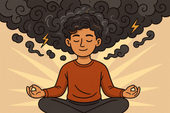
How to Regain Focus After Emotional Stress
After emotional stress, your nervous system feels frayed — your focus fades, thoughts race, and calm seems impossible. Learn how to restore balance, rebuild concentration, and retrain your brain for clarity and peace through evidence-based mind–body tools. 🌿
-
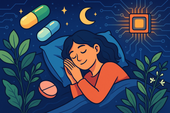
The Future of Sleep Supplements
The future of sleep supplements is here — where science meets nature. Discover how next-generation formulas use adaptogens, amino acids, and biotech innovations to support deep, restorative sleep without dependency. 🌙
-
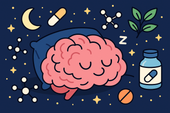
Emerging Research on Sleep and Nootropics
Can nootropics help you sleep better? Discover how compounds like L-theanine, magnesium threonate, ashwagandha, and Alpha-GPC influence neurotransmitters, circadian rhythm, and brain recovery — bridging the gap between smarter days and deeper nights. 🌙
-

New Herbal Extracts for Deep Sleep
Discover the next generation of herbal extracts for deep sleep — from saffron and magnolia to jujube and lemon balm. Learn how these plant-based compounds calm the nervous system, balance cortisol, and promote truly restorative rest. 🌙
-
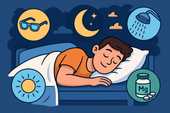
Sleep Biohacking: What Works and What Doesn’t
Biohacking your sleep can sound futuristic — from red light therapy to wearables and supplement stacks. But which hacks actually help, and which are just hype? Discover the science-backed sleep strategies that truly improve rest, recovery, and brain health. 🌙
-
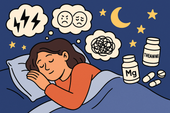
Sleep Support for People with Anxiety Disorders
💭 A restless mind can keep you up all night — thoughts spinning, heart racing, and peace feeling far away. Learn how to quiet overthinking, regulate your nervous system, and create a nightly ritual that teaches your brain to let go and rest deeply. 🌙
-
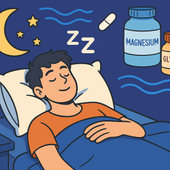
How to Fall Back Asleep After Waking Up
Waking up in the middle of the night? Learn how to fall back asleep quickly and calmly using breathing techniques, stress-reducing rituals, and natural supplements like magnesium and glycine. Restore your body’s rhythm and wake up feeling refreshed.
-
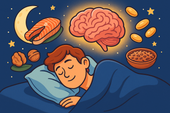
The Role of Omega-3s in Sleep Quality
-
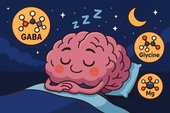
Stacking GABA and Glycine for Deeper Rest
Discover how stacking GABA and glycine can help you achieve deeper, more restorative sleep. Learn how these calming amino acids work together to relax your mind, soothe your body, and improve overall sleep quality—naturally and safely.
-
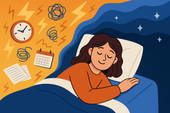
Managing Sleep During Times of Stress
Feeling wired and restless? Learn how to manage sleep during stressful times through nutrition, breathwork, and natural supplements like magnesium and L-theanine. Discover how to calm your nervous system and restore deep, peaceful rest—even when life feels overwhelming.
-

The Role of Magnesium for Night Cramps
Night cramps keeping you awake? Discover how magnesium helps relax muscles, balance electrolytes, and prevent painful spasms. Learn which forms work best, how to take them, and how to pair them with other nutrients for cramp-free, peaceful sleep.
-
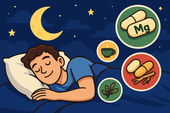
Supplements That Reduce Nighttime Awakenings
🌙 Discover science-backed supplements that help you stay asleep through the night. From magnesium and L-theanine to glycine and ashwagandha, learn how these natural compounds calm your nervous system, balance cortisol, and prevent 2 a.m. wake-ups for deeper, more restorative rest.
-

Nootropics That Promote Calm and Rest
Explore the world of calming nootropics — natural brain enhancers that promote relaxation, better focus, and deeper rest. Learn how L-Theanine, magnesium, ashwagandha, and other adaptogens help balance your nervous system, reduce stress, and support restorative sleep.
-

Best Natural Supplement Stack for Sleep
Discover the best natural supplement stack for deep, restorative sleep. Learn how nutrients like magnesium, L-theanine, glycine, and calming herbs such as chamomile and ashwagandha work together to relax your body, calm your mind, and improve sleep quality—naturally and safely.
-

Combining L-Theanine and Magnesium for Sleep: A Calm Night, Naturally
Discover how combining L-Theanine and Magnesium can help you drift into deep, restorative sleep. Learn how this natural duo calms the mind, relaxes the body, and supports your nervous system—without grogginess the next morning.
-

How to Sleep Better After Intense Workouts
Struggling to fall asleep after a tough workout? Learn how to optimize your post-training recovery with nutrition, hydration, and science-backed sleep strategies. Discover how to calm your nervous system, balance hormones, and wake up fully recharged for your next session.
-

Ashwagandha and Valerian: A Bedtime Combo for Deep Rest and Emotional Reset
Discover the calming synergy of Ashwagandha and Valerian root, two natural sleep aids that help quiet the mind, ease anxiety, and promote deeper rest. Learn how this herbal duo supports the nervous system, balances stress hormones, and restores emotional peace — without next-day grogginess.
-

How to Create a Resilience-Boosting Diet
Discover how to build emotional and physical strength from the inside out with a resilience-boosting diet 🍎. Learn which foods stabilize your mood, how supplements like magnesium and omega-3s strengthen your stress response, and why pairing nutrition with breathwork and therapy creates lasting calm, focus, and vitality 🌿💪.
-

Best Teas and Herbal Blends for Calmness: Nature’s Way to Restore Inner Peace
Ashwagandha, the ancient adaptogenic herb, helps your body find balance during stress. Known as “Indian ginseng,” it supports cortisol regulation, boosts energy, and restores calm clarity. Discover how this powerful root promotes resilience, emotional balance, and steady vitality — one cup at a time. 🌸
-

Parenting and Emotional Strength: How to Raise Children Without Losing Yourself
Empathy is the bridge that connects hearts — the quiet power to understand, feel, and support another’s emotions without judgment. Learn how empathy strengthens relationships, enhances communication, and cultivates deeper compassion in everyday life. 🌿
-

How to Bounce Back from Public Failure: Reclaiming Confidence, Purpose, and Power
Visualization is more than imagination — it’s brain training for resilience. By picturing calm, success, or healing, you activate the same neural pathways as real experience. Learn how daily visualization rewires your brain for confidence, emotional balance, and recovery from stress. ✨
-

Coping with Financial Stress Through Resilience: How to Stay Grounded When Money Feels Tight
Body awareness is the foundation of emotional resilience. By tuning into your body’s signals — tension, fatigue, or calm — you learn to recognize stress before it overwhelms you. Discover how mindfulness, gentle movement, and breathwork can deepen your connection with your body and restore balance from the inside out. 🧘
-

How to Stay Positive During Chronic Illness: A Guide to Emotional Strength and Hope
Creativity is more than art — it’s a form of healing. Whether through painting, writing, music, or small acts of expression, creativity helps release emotion, calm the nervous system, and reconnect you to joy. Discover how to use creativity as a tool for emotional balance, resilience, and self-discovery. 🌿
-

Resilience Tips for Caregivers: How to Stay Strong While Caring for Others
Joy isn’t the absence of pain — it’s the quiet strength to find light even in challenging times. Cultivating joy through small daily moments restores balance, releases stress, and reminds you of life’s beauty. Learn how to reconnect with authentic happiness, rebuild emotional energy, and nurture your nervous system through gratitude, presence, and play. 🌿
-

Building Resilience After a Breakup: How to Heal, Rebuild, and Rise Stronger
Social connection is one of the strongest predictors of emotional resilience. During difficult times, genuine relationships act as anchors — calming the nervous system, reducing stress hormones, and helping you regain perspective. Learn how cultivating real human connection can strengthen your mind, heart, and overall well-being. 🌿
-

How to Stay Emotionally Strong During Job Loss
Your emotions are powered by brain chemistry — a delicate balance of neurotransmitters like serotonin, dopamine, and cortisol. When these chemicals work in harmony, you feel calm, focused, and resilient. Learn how daily habits, nutrition, and mindfulness can support your brain chemistry and boost emotional well-being naturally. 🌿
-

The Role of Hormones in Emotional Stability: How Your Chemistry Shapes Your Calm
Hormones shape more than your body — they shape your emotions, resilience, and sense of calm. From cortisol to serotonin, these chemical messengers influence how you react to stress, connect with others, and recover from challenges. Learn how to balance your hormones naturally to build lasting emotional stability and harmony within. 💫
-

Mitochondria and Emotional Energy: The Cellular Power Behind Your Mood
Breathwork is one of the most powerful tools for emotional regulation and cellular balance. Through intentional breathing, you can calm your nervous system, increase oxygen flow to the brain, and even support mitochondrial energy. Learn how conscious breathing connects body and mind — transforming stress into presence and emotional strength. 🌿
-

Inflammation and Its Impact on Mood Resilience: The Silent Link Between Body and Mind
Inflammation doesn’t just affect the body — it impacts the mind. Chronic inflammation alters brain chemistry, depletes serotonin, and makes emotional recovery harder. Learn how calming inflammation through nutrition, mindfulness, and sleep can restore balance, resilience, and a renewed sense of emotional strength. 💫
-

How Antioxidants Protect Emotional Well-being: The Hidden Link Between Oxidative Stress and Mental Health
Antioxidants do more than protect your body — they defend your mind. By neutralizing oxidative stress, antioxidants support serotonin, dopamine, and brain energy pathways that keep you calm, focused, and emotionally balanced. Discover how foods like berries, green tea, and dark chocolate nourish your brain, boost mood, and strengthen resilience from the inside out. 🌿✨
-

The HPA Axis and Emotional Health: The Hidden Bridge Between Stress and Mind
Neuroplasticity — the brain’s ability to rewire and adapt — is the foundation of emotional healing and resilience. When you face stress, trauma, or change, your neural pathways can reshape themselves to support new patterns of calm, focus, and self-awareness. Learn how daily practices like mindfulness, therapy, and breathwork strengthen neuroplasticity to transform emotional pain into personal growth. 🌸
-

Why Cortisol Control Is Key to Resilience: Mastering Stress to Build Emotional Strength
Controlling cortisol — the body’s main stress hormone — is the secret to lasting resilience. When cortisol levels stay balanced, your mind becomes clearer, emotions steadier, and energy more sustainable. Learn how breathwork, mindset shifts, adaptogens, and daily rhythms can help you calm your stress response and build true inner strength. 🌞💪
-

Dopamine’s Influence on Motivation and Recovery: Reigniting Drive and Balance
Healthy relationships are the foundation of emotional balance and resilience. Whether romantic, familial, or platonic, genuine connection releases dopamine, serotonin, and oxytocin — the brain’s “bonding trio” — helping us feel secure, motivated, and seen. Learn how trust, empathy, and communication not only strengthen your connections but also reshape your nervous system for deeper emotional well-being. 🌿🤝
-

The Role of Serotonin in Resilience: How This “Mood Molecule” Shapes Emotional Strength
Serotonin — often called the “resilience molecule” — plays a vital role in how we handle stress, regulate mood, and recover from emotional challenges. Beyond happiness, this powerful neurotransmitter helps balance the gut-brain axis, stabilize the nervous system, and support emotional flexibility. Learn how nutrition, sunlight, mindfulness, and adaptogens can naturally boost serotonin and strengthen your emotional resilience. 🌞🧠
-

How Neuroplasticity Supports Emotional Growth: Rewiring the Brain for Resilience
Neuroplasticity is the brain’s built-in power to grow, adapt, and heal — and it’s the foundation of emotional transformation. Every mindful breath, compassionate act, or reframed thought strengthens new neural pathways that support resilience and self-awareness. Learn how your brain rewires through daily habits, helping you turn emotional challenges into opportunities for growth and calm. 🌿
-

Tai Chi and Adaptogens for Mind-Body Balance: The Art of Harmonizing Energy and Resilience
Alchemy isn’t just an ancient science — it’s a timeless symbol of transformation and inner balance. By blending the physical and spiritual, alchemy teaches us that change begins from within. Just as metals are refined into gold, we too can transmute emotional pain, stress, and chaos into clarity and strength through mindful practice and self-awareness. 🌙✨
-

Cold Therapy and Emotional Control: Training the Mind Through the Body
Cold therapy isn’t just for athletes — it’s a tool for emotional mastery. By exposing your body to controlled cold, you train your nervous system to stay calm under stress, improving focus, mood, and resilience. This article explores the science of cold exposure, its impact on hormones and the vagus nerve, and how ice baths and cold showers can help you build emotional control, one breath at a time. 🧊🧘♂️
-

How Music Influences Emotional Recovery: The Healing Soundtrack of the Mind
Neuroplasticity — the brain’s ability to rewire and heal itself — is at the heart of emotional recovery. Through mindful habits, music, therapy, and consistent mental stimulation, your brain can form new connections that support resilience and well-being. Discover how neuroplasticity turns pain into growth, helping you rebuild balance, focus, and emotional strength. 🌿
-

Nature Therapy for Building Resilience: Reconnecting With the Healing Power of the Earth
Nature therapy helps rebuild emotional resilience by reconnecting you with the healing rhythms of the Earth. From forest walks to sunlight exposure, nature restores balance to your nervous system, lowers stress hormones, and teaches emotional adaptability. Learn how spending time outdoors can enhance mental clarity, calm anxiety, and awaken your natural capacity to heal. 🌞
-

Breathwork Techniques That Pair with Supplements: The Ultimate Synergy for Stress Relief and Mental Clarity
Breathwork and supplements create a powerful mind-body synergy for stress relief, focus, and energy. By combining intentional breathing with adaptogens, nootropics, and calming nutrients, you can naturally regulate cortisol, sharpen mental clarity, and boost emotional balance. This guide explores the best breathwork techniques and supplement pairings to help you feel centered, calm, and energized from the inside out. 🌿
-

Why Cortisol Balance Matters for Emotional Strength
Balancing cortisol — your body’s main stress hormone — is essential for emotional resilience. When cortisol is chronically high, your mind stays stuck in survival mode, leading to fatigue, anxiety, and emotional instability. This article explores how nutrition, supplements, breathwork, and therapy can help restore healthy cortisol rhythms, regulate the nervous system, and strengthen your ability to handle life’s challenges with calm focus and emotional strength. 🌿
-

Best Supplements for Students During Exam Season: Focus, Energy, and Memory Support
Studying late into the night? Learn which natural supplements can boost focus, memory, and mental stamina during exam season — without the crash. From omega-3s to Bacopa and Rhodiola, discover your brain’s ultimate exam support stack. 🎓🧠
-

Natural Memory Boosters for Seniors: How to Keep Your Mind Sharp and Focused
Stay mentally sharp and confident as you age. Discover science-backed natural supplements and lifestyle habits that boost memory, focus, and brain longevity for seniors. 🌿🧠
-

The Link Between Stress, Cortisol, and Memory Loss
Chronic stress can quietly erode your memory — and cortisol is the key culprit. Learn how stress hormones affect the brain, why the hippocampus shrinks under pressure, and how natural strategies can help you restore memory and mental clarity. 🧠✨
-

How to Build a Daily Supplement Routine for Memory Health
Want to sharpen your memory and stay mentally clear? Learn how to build a daily supplement routine for memory health — from morning focus to nighttime brain repair. Discover science-backed nutrients that boost recall, focus, and long-term cognitive resilience. 🧠🌿
-

Top 5 Natural Supplements for Memory Recall and Focus
Looking to boost memory and concentration naturally? Discover the top 5 supplements — Bacopa, Ginkgo Biloba, Lion’s Mane, Rhodiola, and Phosphatidylserine — that enhance focus, recall, and long-term brain health. 🧠✨
-

Top Supplements to Balance Mood Naturally
From omega-3s to adaptogens, discover the top natural supplements proven to support emotional balance, reduce stress, and promote inner calm — safely and effectively. 🌿✨
-

Can Omega-3 Fatty Acids Help with Mood Disorders?
Omega-3 fatty acids do more than support heart health — they can help balance mood, reduce depression, and calm anxiety. Discover how EPA and DHA nourish your brain, fight inflammation, and support emotional well-being from within. 🌊🧠
-

Vitamin D and Mood: The Sunshine Vitamin for Emotional Balance
Could the key to emotional balance be as simple as a little sunlight? Discover how vitamin D — the sunshine vitamin — influences serotonin, reduces inflammation, and helps you feel more positive and resilient year-round. ☀️💛

















































